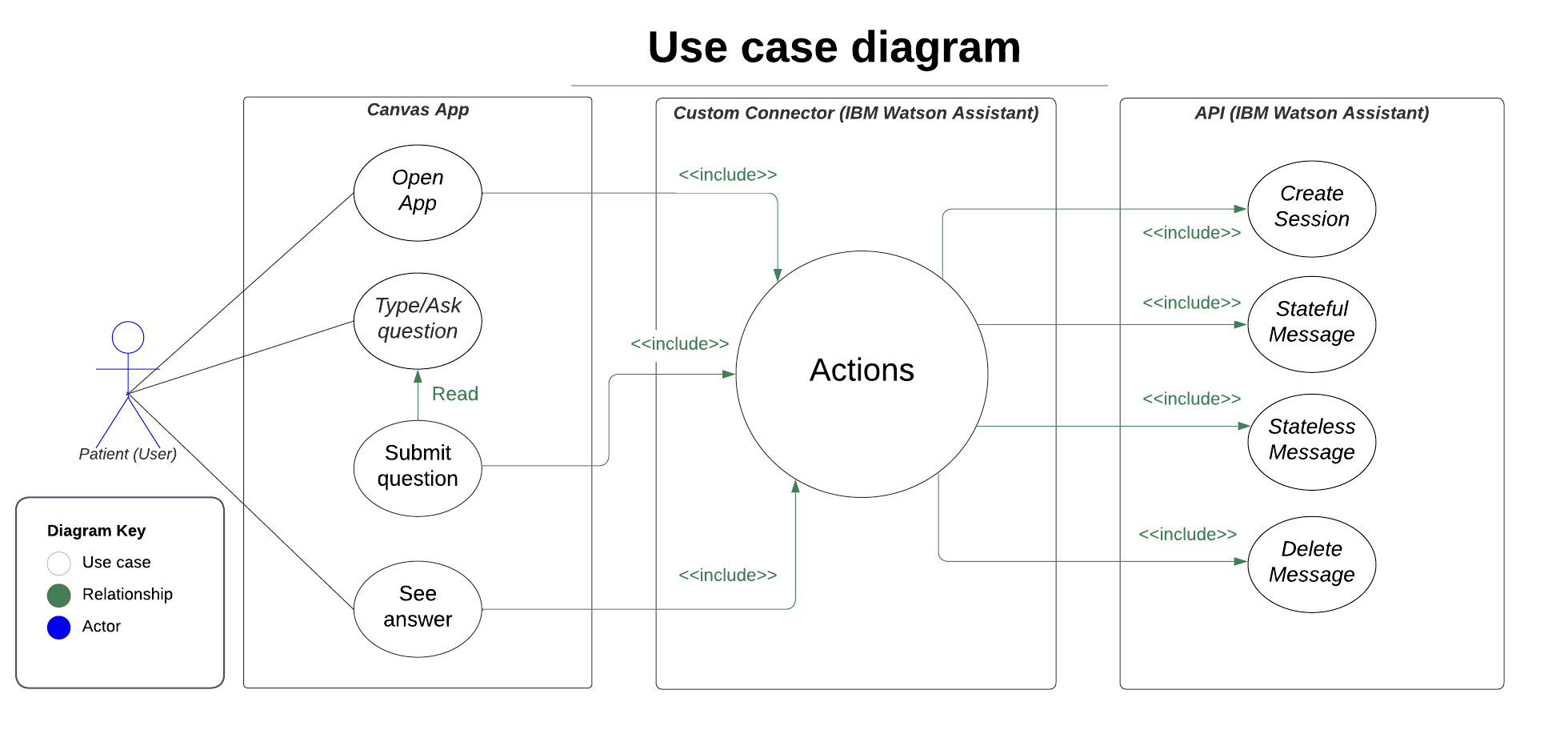Requirements
Background and partner introduction
Microsoft Power Platform
“Do more with less by using low-code tools to adapt”. Power Platform1 by Microsoft, found in 2018, is a package of software development tools that allows business to build their own intelligent system in a low-code environment. It enables specialists that are unfamiliar with coding and software development to create their own applications and automated solutions for tackling their daily business problems.
The Power Platform family of products includes:
- Power BI2: Provides tools for visualizing date in charts. It also comes with analytics tool at enterprise scale as well as security tools that monitor and secure the safety of sensitive data.
- Power Apps3: Gives everyone the ability to build and launch mobile apps without the knowledge of advanced coding professional developers have using simple drag and drop design, with high extensibility offered by Azure functions and custom connectors
- Power Pages4: Enables website to be built in minimum complexity with easy-to-use and fully customizable templates, that can also be extended by web developers with advanced functionalities using tools like Visual Studio Code, Github and Azure DevOps
- Power Automate5: Allows business to build automated process using low-code, drag and drop tools, including custom connectors and templates, to automate repetitive tasks. Unique scenarios can also be generated with advanced low-code AI.
- Power Virtual Agents6: Make, test, and publish bots across multiple languages across websites and platforms using simple drag-and-drop tools. Self-learning AI with natural language processing also improve bots accuracy and reliability.
IBM Watson:
Introduced in 2010, IBM Watson7 was a question-answering computer system capable of answering questions posed in natural language8. It was built with advanced natural language processing, information retrieval, knowledge representation, automated reasoning, and machine learning technologies.
Nowadays, IBM Watson is part of IBM Cloud which offers more than 700 AI solutions to problems across all fields scales from personal use to enterprise level. These solutions include data analysis, automation, blockchain, cloud computing, security and more.
- Microsoft Power Platform
- Power BI
- Power App
- Power Pages
- Power Automate
- Power Virtual Agents
- IBM Watson
- The DeepQA Project
References
Goals
Healthcare system is always one of the nation's top priorities in budget allocation and governing plan. The goal to maximize healthcare's efficiency alongside providing medical specialists a comfortable working environment is always hard to achieve in this stressful industry. This is where AI solutions come in handy, as they allows automation and analysis of high volume of data with minimum cost of manpower. Yet in contrast with how AI specializes in simplifying and reducing workload, developing a large scale AI dependant system requires advanced and complex development which medical specialists may find overwhelming.
Our goal is to create system development tools for these medical specialists to build their own system personalized to best suit their working environment, by providing a low-code developing environment in the front end, while developers like us maintain and extend the environment with codes hidden behind the backend.
Therefore, we are trying to utilise AI solutions offered by IBM Cloud and make them available for use in low-code software development platform such as Microsoft Power Platform. This is possible by building custom connector that connects Power Platform with IBM Cloud's open APIs. As custom connector is an open source tool offered in power platform, we believe our try in building one can inspire the connector community to further develop connectors with IBM Cloud, leading to the final goal of enabling all IBM Cloud resources to be used in Power Platform, stretching the already powerful capability it has.
Requirements Gathering
Technology:
In order to understand more about the technology we are trying to use in our project, we have conducted several online meetings with our clients. We asked them what deliverables they expect us to complete, and what they are trying to achieve.
We were told to try, learn and build as much custom connector as we could, with all the available APIs IBM Cloud offers. After building a functional connector successfully, we should report back to the team on our experience with the technology and provide feedback on what the platform can improve on.
Scenario:
As time is limited for our project, we wish to pick and work on APIs that suit best for our scenario. To achieve that, we wanted to gather information and wishes from stakeholders inside the healthcare industry. A questionnaire was therefore produced and sent out to general practitioners (GPs) and patients to gather their opinion, using Google Form (as a free of charge option with organized data representation and simple data analytic tools, alongside with secure storage trusted by the general public). Shown below are some responses from the GPs.
After discussing methods of gathering user requirements, we decided to send out Google Forms to General Practitioners (GPs) and Patients to fill them up. Below are some responses from the GPs.
GPs
Yes, the most time-consuming part of our job is determining the type of illness the patient is suffering from. This is because a high level of accuracy is needed to ensure that the right prescriptions are given to them. It would also be useful if we are able to see all the past medical reports of a patient, stored in a dataset, compiled in a more readable format.
Q2: Do you want a platform that assists in optimising workflow/automation? Why or why not?
Yes. We realise that the waiting time for meeting GPs is very long and we are trying to find ways to cut it short to improve the experience of patients with GPs. A platform where GPs can analyse previous medical records using some AI functionalities and draw useful data from it would be really helpful
Q3: If we were to build a connector accessing IBM Watson's APIs, what features would you like to see?
We would like to accurately identify the type of illness the patient is suffering and carry out the best procedure for them. The use of AI to analyse data from patients and match them with our dataset to identify illnesses would save a lot of time. Ideally, the platform should also be simple to use and with minimal and clean UI to encourage GPs to use it.
Q4: What are your thoughts on the use of AI in healthcare?
AI is a great tool to help us in our work. It can help us to analyse data and draw useful information from it. However, we need to be careful when using AI as it can be easily manipulated and used for malicious purposes. We need to ensure that the data we are using is accurate and reliable.
Patients
Around once a month. My experiences with GPs were great. The problems arises at the process of getting an appointment due to the shortage of GPs in the UK. Due to the long wait, I usually only visit my GP if I'm suffering from a more serious illness or if I've been ill for quite some time. However, since I am suffering from stage 1 hypertension, I need close monitoring from GPs and clinicians every month to ensure that I reach my blood pressure goals.
Q2: Which process of your visit takes the longest time/longer than it should be?
Getting a time slot to meet the GP/waiting at the hospital. Sometimes it could be hours and hours of just sitting in the hospital waiting to be attended by one of the staff. It can get quite frustruating.
Q3: Do you have any suggestion on how to speed those processes up/automate those tasks?
NHS should be provided with a platform that helps GPs by automating the scheduling of tasks and appointments or help with medical prescriptions to optimise workflow. This is because I think GPs are spending way too much unnecessary time on a patient and some of their tasks should be automated. Also, it should accurately estimate the waiting time for patients in the hospital so instead of waiting for hours in the queue, we could just show up 10-15 minutes before the appointment. I believe there are many people having the same experience as me and this would really leverage the problem of GP shortage in the country.
Personas
With the responses from Google forms, we constructed personas for both our stakeholders and determine what they would like to see if an application is built utilizing AI solutions using Microsoft Power App.
Persona 1

John Smith, 54, Male, A general practitioner of 20+ years in a local hospital.
- Identify patients' illness accurately based on their symptoms
- Carry out appropriate treatment to specific illness
- Identify potential health threats for a patient
- Automate tasks that are repetitive and time-consuming
- Optimise workflow
- Improve patient experience
- Simple and clean UI, easy to use
- A good visualizing database with patients' personal information and past medical records
- AI tool that predicts possible illnesses that a patient is suffering from (by matching similar symptoms/medical issues)
Persona 2

Harry Wilson, 72, Male, A retired patient with stage 1 hypertension.
- Reliable GP that can
- Long queues to reserve a time slot for consulting GPs
- GPs giving the wrong advice due to lack of information
- A smart scheduling system that cuts wait time by fitting more appointments in a time slot.
- An integrated platform to fill in their information and medical records that is accessible by all GPs.
Use Cases
While there are infinite possible use cases for the custom connectors we built, we suggested an online appointment making bot as a template showing the capability of one of the IBM Cloud APIs, IBM Watson Assistant.

Moscow Diagram
Based on our template use case, we have constructed the following MoSCoW list for other developers that wish to use our connector for reference.
| Priority | Requirement for Connector | Requirement for Canvas App |
|---|---|---|
| Must-Have |
|
|
| Should-Have | All methods from API for front-end app users |
|
| Could-Have |
|
Custom flow template for automation |
| Won't-Have | All APIs offered by IBM Watson (Exceeded limited project time) |
|
References
- DragonImages. Portrait of unsmiling mature general practitioner in glasses. Available at: https://th.bing.com/th/id/R.2e2e2c55a9074ada54c11e45e848b76a?rik=rslBi9RY1g0n1Q&pid=ImgRaw&r=0 (Accessed: 7 November 2022)
- Nyul. Portrait of smiling old man having coffee, looking happy. Available at: https://thumbs.dreamstime.com/b/smiling-old-man-having-coffee-portrait-looking-happy-33471677.jpg (Accessed: 7 November 2022)